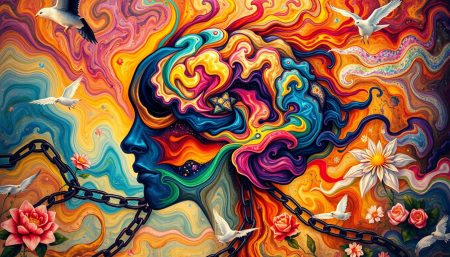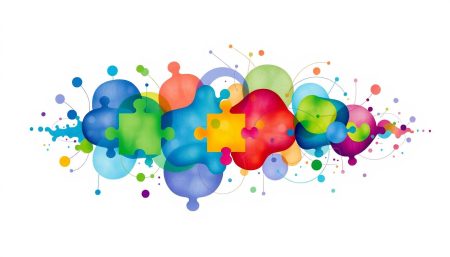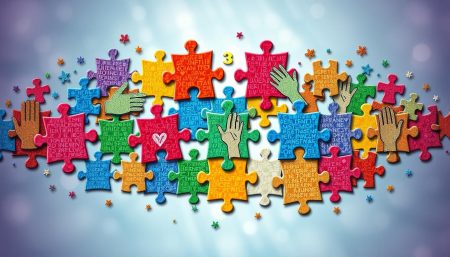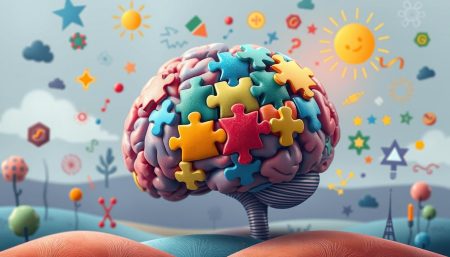Many have wondered if autism spectrum disorder is a mental health issue. This developmental disability affects how people communicate, behave, and interact with others. It makes it hard to fit into traditional medical and educational categories.
As we learn more about autism, people with autism, their families, and doctors are still looking for answers. They want to understand what autism is all about.
It’s important to know that autism is different from other mental health conditions. This helps us give the right support and resources to those with autism. We aim to explain autism clearly, helping to clear up any confusion.
Key Takeaways
- Autism spectrum disorder is a complex developmental disability with a wide range of symptoms.
- Understanding the nature of autism is key to distinguishing it from mental health conditions.
- Clarification of autism’s classification can guide better support for individuals and families.
- Educational information is crucial in dispelling myths surrounding the autism spectrum.
- Our empathetic approach aims to provide accessible medical insights and inspiring stories.
Understanding Autism Spectrum Disorder
The term Autism Spectrum Disorder (ASD) covers a wide range of neurodevelopmental disorders. These disorders show different levels and types of autism symptoms. It’s important to understand both the strict medical definition and how it has changed over time.
Definition of Autism
Autism is marked by challenges in social interaction, communication, and repetitive behaviors. These autism symptoms can greatly impact daily life and are often seen in early childhood. Each person with autism is unique, with their own pattern of behavior and severity level. This is why we call it autism spectrum disorder.
Historical Context and Classification
The way we understand and classify autism has changed a lot over time. At first, autism was seen as a form of psychosis or other severe mental health issues. Now, we know it as a neurodevelopmental disorder. This change has greatly influenced how we diagnose and treat it.
| Period | Classification | Key Characteristics |
|---|---|---|
| Early 20th Century | Mental Health Condition | Predisposition to psychosis |
| 1970s-1980s | Emerging Neurodevelopmental Understanding | Focus on cognitive and behavioral symptoms |
| 1990s-Present | Autism Spectrum Disorder | Wide symptom spectrum, individual variability |
The Relationship Between Autism and Mental Health
Autism, once seen as a developmental disability, now shows a link to mental health issues. This connection makes understanding and helping those with autism more complex. It opens doors to better support and treatment.
Common Co-occurring Conditions
People with autism often face mental health problems like anxiety and depression. These issues can make it harder for them to communicate and interact socially. This can really affect their daily life and happiness.
Autism as a Neurodevelopmental Disorder
Autism isn’t just a mental health issue, but it often comes with mental health challenges. It changes how someone sees the world and interacts with others. Knowing this helps us see autism as different from mental health conditions, but also shows the need for mental health care in treatment.
| Condition | Prevalence in Autism | Impact on Daily Life |
|---|---|---|
| Anxiety | High | Increases social and communication challenges |
| Depression | Common | Affects motivation and energy levels |
| ADHD | Frequently co-occurs | Complicates focus and behavior management |
It’s key to tackle both autism’s neurodevelopmental aspects and mental health issues in care plans. By understanding autism’s complex nature, we can better support those with it. This helps caregivers and doctors help more effectively.
Diagnostic Criteria for Autism
Understanding the autism diagnosis framework is key for managing and supporting this developmental disability. The DSM-5 classification is a crucial tool for healthcare professionals. It offers a standardized approach to diagnosing autism.
DSM-5 Classification
The DSM-5 categorizes autism under Autism Spectrum Disorders (ASD). It highlights the wide range of symptoms and their severity. Key signs include persistent social communication and interaction problems, and restricted behaviors or interests.
These symptoms must appear early in life and affect daily functioning. They limit or impair everyday activities.
Role of Healthcare Professionals
Healthcare professionals are vital in diagnosing and managing autism. Their role goes beyond just diagnosing. They provide ongoing support and strategies tailored to each individual’s needs.
Understanding the DSM-5 classification is crucial. It helps professionals offer precise care. This care greatly improves the lives of those with autism.
| Aspect | Detail |
|---|---|
| Communication Challenges | Difficulty in back-and-forth conversation, reduced sharing of interests or emotions. |
| Social Interaction | Struggles with social reciprocity; failure to initiate or respond to social interactions. |
| Repetitive Behaviors | Repetitive motor movements, use of objects, or speech. |
| Response to Sensory Input | Hyper or hyporeactivity to sensory input or unusual interest in sensory aspects of the environment. |
| Impact on Daily Functioning | Significant impairment in social, occupational, or other important areas of current functioning. |
Collaboration among healthcare professionals is crucial. It relies on the DSM-5 classification. This approach improves therapy outcomes and supports individuals with autism.
It ensures everyone gets the support they need. This helps them face their unique challenges.
Myths and Misconceptions About Autism
Many myths about autism still exist, affecting how people see and support those with it. We will clear up two big misconceptions. These are about autism and intelligence, and the wrong idea that autism is a mental health issue.
Autism and Intelligence
One big misconception about autism is thinking all autistic people are the same in intelligence. But, research shows they can have a wide range of abilities. Some are incredibly gifted, while others face challenges.
This shows we need to tailor education and support to each person’s needs. It’s not one-size-fits-all.
Autism is Not a Mental Illness
Another common mistake is thinking is autism a mental health condition? No, it’s a neurodevelopmental disorder. This is important for getting the right treatment and acceptance.
Autism affects how people communicate, behave, and interact socially from a young age. It’s not a mental illness.
| Myth | Fact |
|---|---|
| All autistic people have the same level of intelligence | Intelligence levels among autistic individuals can vary widely, just as they do in the general population. |
| Autism is a mental health condition | Autism is a neurodevelopmental disorder, affecting the developmental aspects of the brain but it’s not classified as a mental health condition. |
| Autistic individuals cannot lead independent lives | Many autistic people can lead fulfilling, independent lives with tailored support and education. |

It’s important to debunk these autism myths to better understand and support autistic people. By doing so, we give them the respect and dignity they deserve. As we challenge these misconceptions about autism, society becomes more welcoming. This lets individuals on the spectrum reach their full potential.
Treatment Options for Individuals with Autism
Looking into effective autism treatment plans is key for better daily life and happiness for those with autism. Each plan is made just for them. It includes early intervention and behavioral therapies to meet their specific needs.
Behavioral Therapies
Behavioral therapies are at the heart of autism therapy. They aim to boost social skills, communication, and learning methods. Applied Behavior Analysis (ABA) is known for helping people learn new skills and manage tough behaviors.
Medication for Comorbid Conditions
Medicine doesn’t cure autism’s main symptoms. But, it can help with related issues like anxiety, depression, and ADHD. Doctors choose treatments based on each person’s symptoms and health history.
Supportive Services and Interventions
Supportive services add a lot to autism treatment. They offer speech and occupational therapy, and special education programs. Early intervention programs are especially important. They help at a critical time in development.
The path to autism therapy is long and involves many professionals. From pediatricians to specialized therapists, they all work together. Their goal is to give care that fits each person’s unique needs.
The Role of Family in Managing Autism
Family plays a big role in managing autism. They are the main caregivers and provide constant support. They help with daily tasks and long-term plans for those with autism. Using autism support helps families assist better and improve life for their loved ones.
Importance of Family Support
Family support is key in caring for those with autism. It includes physical, emotional, educational, and behavioral help. Families learn about autism to better support their loved ones. Being involved in therapy and educational programs helps support consistently at home and in therapy.
Resources for Families
Families need resources to manage autism. Support groups, online and in-person, help families share and learn. Educational materials and legal resources inform families on how to care for their loved ones.
Getting advice from experts is also important. A study found that family therapy can improve communication and coping. You can find more information in this study.
| Type of Resource | Description | Benefit to Family |
|---|---|---|
| Support Groups | Meetings with other families and professionals experienced in autism care. | Emotional and experiential support |
| Educational Materials | Books, articles, and online materials outlining autism care strategies. | Enhanced understanding and implementation of care techniques. |
| Legal Assistance | Guidance on rights and services available for individuals with autism and their families. | Secured access to entitled services and rights protection. |
Using these resources helps families manage autism better. It ensures everyone can help in the development and happiness of their loved one with autism.
The Impact of Autism on Daily Life
Autism changes daily life a lot, especially in social interactions and employment. People with autism face many challenges and opportunities. These affect how they communicate, interact, and succeed in different places.
Social Interactions and Communication
Many with autism find social interactions hard. They struggle with understanding social cues, making eye contact, and talking. These issues make it tough to make friends, do well in school, and work with others.
But, with the right communication strategies and supportive places, they can do better. They can have more positive social experiences.
Employment Challenges and Opportunities
Finding a job is tough for those with autism. The job world often doesn’t fit their needs for order and predictability. But, if employers are open and make changes, people with autism can shine. They bring new ideas and skills to their jobs.
- Changes like quiet areas and clear instructions can make a busy office work for someone with autism.
- Mentorship programs help match what employers want with how someone with autism works.
Talking about autism daily life impact means looking at how different people are affected. Every person with autism has their own strengths and challenges. Their stories show their resilience and the wide range of their abilities.
Advocacy and Awareness for Autism
In the world of autism, autism advocacy, education and awareness are key. Learning about autism helps build inclusive communities and better support systems. Awareness campaigns light the way to understanding and acceptance in schools and society.

Importance of Education and Awareness
Advocacy for autism grows with more education and awareness. Good communication, engaging materials, and community outreach are crucial. They change how people see autism, helping those with it to thrive.
Famous Autistic Individuals
Sharing stories of famous autistic individuals is vital for awareness. Their achievements show the potential of the autistic community. They challenge stereotypes and win respect.
Stars like Temple Grandin and Dan Aykroyd are leaders in acceptance. They share their autism openly, inspiring others to understand and appreciate it.
- Temple Grandin: Academic and animal behavior expert
- Dan Aykroyd: Actor and scriptwriter
Research and Advances in Autism Understanding
As we explore autism, new trends and findings are changing how we see and treat it. Autism research is uncovering important details. These discoveries are leading to autism advances that will improve life for those with autism spectrum disorder.
Current Trends in Autism Research
Autism research now focuses on precision medicine and treatments tailored to each person. New technologies like AI and machine learning help analyze huge amounts of data. This is changing how we diagnose and treat autism.
Neurobiological Studies and Findings
Studies on the brain are key to understanding autism. Advanced imaging and genetics have helped us see how autism affects the brain. This knowledge opens up new ways to help.
- Genetic Variants Associated with Autism
- Role of Environmental Factors in Autism Incidence
- Emerging Neurobehavioral Intervention Techniques
These neurobiological studies are vital for research and treatment. They offer hope to families, showing the way to better treatments.
Staying updated on neurobiological studies helps everyone work together. This way, we can support autism advocacy and move towards a more inclusive world.
Autistic Individuals and Mental Health
Looking into autism and mental health shows that while some debate if autism is a mental health condition, the mental health needs of autistic people are clear. This part explores these needs and shares strategies to boost mental health in the autism community.
Understanding Mental Health Needs
People with autism often face bigger mental health challenges. This is because of their unique sensory, cognitive, and social differences. Anxiety disorders, depression, and emotional issues are common in autistic individuals. They need mental health support that understands and works with autism.
Coping Strategies for Autistic Individuals
Good coping strategies are key for managing stress and improving life for those with autism. These strategies help the individual and support families and caregivers in creating a caring environment for mental health.
- Mindfulness and relaxation techniques to reduce anxiety.
- Structured routines that provide predictability and a sense of security.
- Social skills training to enhance communication and interpersonal interactions.
- Professional counseling from therapists who specialize in autism spectrum disorders.
The table below shows some coping mechanisms tailored for autistic individuals:
| Strategy | Description | Benefits |
|---|---|---|
| Mindfulness | Practices like meditation and controlled breathing. | Reduces stress, focuses mind, improves emotional regulation. |
| Visual Schedules | Charts or apps that outline daily or weekly tasks. | Increases independence and reduces anxiety about unexpected activities. |
| Social Stories | Custom stories that explain social situations and appropriate responses. | Enhances understanding of social cues and expectations, improving social interaction. |
The Future of Autism Treatment and Perception
The world of autism perception and treatment is always changing. This is thanks to ongoing research and the efforts of autism advocates. The future of autism treatment will focus on treatments that are more tailored and all-encompassing. This will help improve the lives of those with autism.
Evolving Perspectives on Autism
Our understanding of autism has changed a lot in recent years. We used to see autism mainly as a disability. Now, we recognize the unique abilities and viewpoints of people with autism. This shift in autism perception is key to creating more welcoming communities. It also helps people with autism to fully join in with society.
Innovations in Support and Therapy
The innovations in therapy for autism spectrum disorders (ASD) have been impressive. We’ve seen everything from new tech tools to fresh therapy methods. These changes are making treatment better and offering more support for families. Here’s a look at how old and new therapies compare:
| Traditional Therapy | Modern Innovations |
|---|---|
| Behavioral Adjustment Techniques | AI-powered Therapeutic Apps |
| Limited Tailored Interventions | Personalized Therapy Plans based on Genetic Information |
| General Family Support Programs | Targeted Family Training and Online Support Networks |
These innovations in therapy show how autism treatment is constantly evolving. They meet the unique needs of each person. This makes treatments more effective and gives those receiving them more control.
Understanding the genetic roots of autism can greatly improve autism treatment in the future. This is similar to how we’ve made progress in other brain conditions.
As our society becomes more inclusive and understanding, the future is looking up for people with autism. Thanks to ongoing innovation and a change in how we see autism, their journey is becoming one of celebration, not just challenge.
Conclusion and Resources
We’ve learned a lot about autism spectrum disorder. It’s not just a mental health issue; it’s a neurodevelopmental disorder with its own challenges and strengths. Early intervention and accurate diagnosis are key to improving lives of those with autism.
We’ve also debunked myths and looked at how autism relates to mental health. Family and society play a big role in creating a supportive environment for those with autism.
Summary of Key Points
Autism has its own set of social, communicative, and behavioral patterns. Saying it’s a mental health condition doesn’t capture its full complexity. There’s a growing understanding of autism, thanks to research and advocacy.
Seeing autism as a developmental disability, not a mental illness, is important. It helps us accept and support those with autism better. Our goal is to help them reach their full potential.
Helpful Resources for Further Information
If you want to learn more about autism spectrum disorder, there are many resources available. The Autism Society offers educational resources and community support. The Centers for Disease Control and Prevention (CDC) has guidelines on early intervention.
Peer-reviewed journals like the Journal of Autism and Developmental Disorders share the latest research. These resources are great for learning and supporting those affected by autism.
FAQ
Q: Is Autism Considered a Mental Health Condition?
A: No, autism is not seen as a mental health issue. It’s a developmental disorder. It affects how people interact, communicate, and learn.
Q: What is Autism Spectrum Disorder (ASD)?
A: Autism Spectrum Disorder (ASD) is a complex disorder. It affects social interaction, communication, and behavior. The term “spectrum” shows the wide range of experiences and abilities in autism.
Q: How Has Autism Been Classified Historically?
A: Autism’s classification has changed over time. It was once linked to schizophrenia or seen as a parenting issue. Now, it’s recognized as a neurodevelopmental disorder with a strong genetic link.
Q: What Mental Health Conditions Commonly Co-occur with Autism?
A: People with autism may also have conditions like anxiety, depression, ADHD, or OCD. These conditions need their own treatments, separate from autism.
Q: What is the DSM-5 Classification for Autism?
A: The DSM-5 calls autism “Autism Spectrum Disorder.” It has specific criteria for social communication and repetitive behaviors. Symptoms must be present from early childhood.
Q: How Do Healthcare Professionals Diagnose Autism?
A: Doctors diagnose autism through behavioral observations and developmental history. They use standardized tools and criteria, like the DSM-5.
Q: What Are Some Common Myths About Autism?
A: Myths include thinking all autistic people are the same or lack intelligence. Autism is a spectrum, with a wide range of abilities and characteristics.
Q: Is Autism a Mental Illness?
A: No, autism is not a mental illness. It’s a developmental disability that affects brain growth and development. It’s lifelong and changes how individuals see the world and interact with others.
Q: What Treatments Are Available for Autism?
A: Treatments include behavioral therapies like Applied Behavior Analysis (ABA). There are also support services and medications for co-occurring conditions.
Q: What Role Does Family Play in Managing Autism?
A: Family is key in supporting individuals with autism. They provide emotional support and work with professionals for tailored interventions.
Q: How Does Autism Impact Daily Life?
A: Autism affects daily life in many ways. It impacts social interactions, communication, and sensory sensitivities. Each person’s experience is unique, affecting their life in different ways.
Q: Why is Advocacy and Awareness Important for Autism?
A: Advocacy and awareness are crucial. They ensure individuals with autism get acceptance, support, and resources. They help combat stigma and promote inclusion.
Q: What Does Current Research Say About Autism?
A: Research focuses on genetics, brain connectivity, early intervention, and therapy effectiveness. It aims to improve our understanding and treatment of autism.
Q: How Can Autistic Individuals Cope With Mental Health Issues?
A: Autistic individuals can cope with mental health issues through tailored support. This includes cognitive behavioral therapy, mindfulness, and a strong support network.
Q: What Might the Future Hold for Autism Treatment and Perception?
A: The future may bring more personalized treatments and greater inclusion. There could be advancements in technology aids and a decrease in stigma.
Q: Where Can I Find More Information and Resources on Autism?
A: For more information, check out Autism Speaks, the Autism Society, and the National Autistic Society. There are also educational materials, research, and support networks dedicated to autism awareness and treatment.


















